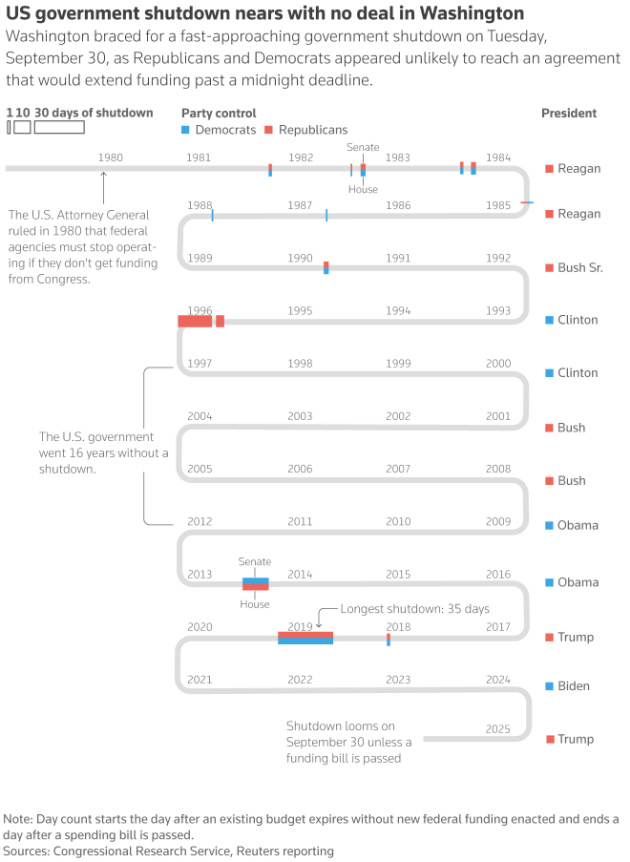With Washington closed after Tuesday's congressional impasse, markets are left in a bit of quandary about how to interpret the hiatus and which economic data to focus on if this week's key jobs reports are furloughed along with government workers.
The only thing investors have to go on is how markets behaved during previous closures, pretty nonchalantly for the most part and explaining why buoyant Wall Street stocks ended higher within a whisker of new records again on Tuesday as the deadline loomed.
But the uncertainty isn't great at a time when domestic politics is in flux and the economy is hard to read, with the lack of key data as a result of the shutdown possibly stoking additional volatility on less-reliable private sector economic readouts. As a result, the VIX volatility gauge has popped higher towards 17 early on Wednesday as the final quarter of the year got underway, stock index futures backed away about from their latest highs, the dollar was softer, and gold rallied again to new records.
Compounding the sense of suspended animation in world markets, Chinese markets began their Golden Week holiday on Wednesday. Elsewhere, the euro was firmer as core euro zone inflation readings for September came in slightly hotter than forecast and encouraged bets that the European Central Bank is done easing for this cycle.
U.S. government funding lapsed at midnight, setting up furloughs across agencies and likely delaying the September jobs report, a key input for rate-cut odds later this month. Strategists warn the lack of timely macro prints could amplify swings in rates and FX as markets lean on high-frequency proxies instead.
With the government shutdown halting statistical releases, Friday's nonfarm payrolls report is likely off the calendar, pushing investors to lean on private and survey-based gauges instead.
JOLTS showed job openings rose marginally in August while hiring declined and consumer confidence fell more than expected, so today's ADP reading takes on outsized importance for near-term Fed expectations. Prolonged disruption could also affect mid-October inflation reports if data collection is impaired.
Japan's Nikkei slipped about 1% after an 11% surge last quarter, as a stronger BOJ Tankan and recent hawkish signals kept the risk of a rate hike in focus. The yen firmed modestly with the dollar index easing, and traders largely looked past the Tankan details as the broader U.S. policy and shutdown backdrop set the tone.
The bigger issues on the horizon are the Japanese ruling party's leadership election over the next week and a likely Bank of Japan interest rate rise later this month. Broader Asia equities were mixed, with South Korea higher and Chinese markets shut for a holiday.
TODAY'S MARKET MINUTE
The U.S. government shut down much of its operations on Wednesday as deep partisan divisions prevented Congress and the White House from reaching a funding deal, setting off what could be a long, grueling standoff that could lead to the loss of thousands of federal jobs.
U.S. Defense Secretary Pete Hegseth slammed "fat generals" and diversity initiatives that he said led to decades of decay in the military and told a rare gathering of commanders on Tuesday they should resign if they do not support his agenda.
Pfizer and President Donald Trump on Tuesday said they had cut a deal in which the U.S.-based drugmaker agreed to lower prescription drug prices in the Medicaid program to what it charges in other developed countries in exchange for tariff relief.
The London Metal Exchange’s zinc inventory is now so depleted that it would cover less than one day's worth of global consumption. ROI metals columnist Andy Home explains why this market may need a Chinese booster.
Experts may disagree about which minerals and metals are genuinely critical, but one thing is certain, writes ROI columnist Clyde Russell. The prices of many of them are currently weak and not reflecting their supposed importance to the global energy transition.
CHART OF THE DAY

The long history of temporary U.S. government shutdowns on funding impasses shows that they rarely affect longer-term economic or market trends. The length of the delay likely dictates any short-term volatility.
TODAY'S EVENTS TO WATCH
* U.S. September private sector payrolls survey by ADP (8:15 AM EDT) US September manufacturing surveys from S&P Global (945: AM EDT) and ISM (10:00 AM EDT), US August construction spending (10:00 AM EDT)
* Richmond Federal Reserve President Thomas Barkin speaks; Bank of Canada meeting minutes
* U.S. corporate earnings: Conagra Brands
* Denmark hosts informal summit of EU leaders in Copenhagen to discuss common defense policy and support for Ukraine